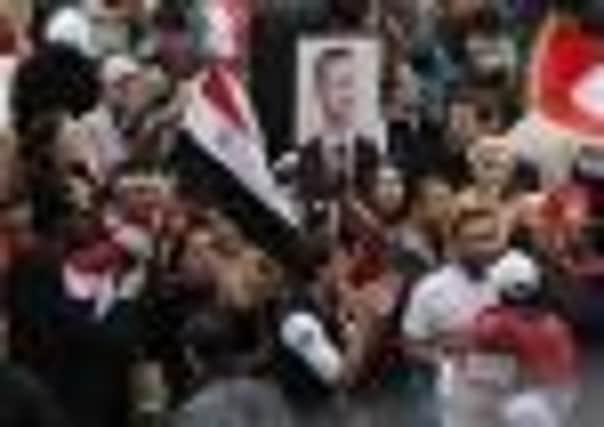Syria: Mistrust at Bashar al-Assad’s vow on vote


The referendum will vote on a draft constitution that would effectively end nearly 50 years of single-party rule, Syrian state TV reported yesterday. The new document removes Article 8 which declares the Baath Party, in power since 1963, the “leader of the state and society”.
Once the referendum has taken place, elections would be held with 90 days.
Advertisement
Hide AdAdvertisement
Hide Ad“The political system of the state will be based on a principle of political plurality and democracy will be practiced through the voting box,” Syria TV cited the draft as saying.
But evidence of the president’s promises of “a new era in co-operation with all spectrums of the Syrian people” was in scant supply on the ground yesterday as troops continued to bombard rebellious suburbs of Homs, and laid siege to part of Damascus.
Forces from the president’s elite 4th Division, backed by armoured personnel carriers, stormed the Barzeh district of the capital, in the closest deployment of troops to the centre of the city so far in the 11-month uprising. Roadblocks were set up in the early morning, and 4x4s, trucks and buses carrying troops drove into the district.
One activist said: “They shot their guns randomly in the air and arrested passers-by. They took more than 100 residents of Barzeh. They ordered students going to school to return to their homes. Then they ran raids, breaking into houses, smashing and looting possessions and taking the men prisoner.”
Troops were searching for the armed militia men that call themselves members of the Free Syrian Army, residents said. Even in the centre of the capital, the heartland of the regime, members of the opposition have formed armed cells.
For the past few months, as night fell over Barzeh, crowds have gathered among the crumbling old city walls to shout for the downfall of the regime. Such protests last only minutes – and have been violently dispersed up by security forces. But recently – when surrounded by their own militia men – the crowds had become ever more openly defiant and have been able to hold large celebratory protests for nearly a month.
“Now we have our fighters to protect us; the regime knows this and they don’t dare to come here. We are not safe, but now if the regime wants to come he has to bring tanks and troops,” said Asra, a Sunni Muslim who has been calling for the demise of the regime since early April.
Yesterday, troops stationed at the Tishreen Military hospital in Damascus had slipped away from their posts, activists said. They defected to Barzeh, prompting the violent crackdown by Mr Assad’s men.
Advertisement
Hide AdAdvertisement
Hide AdOpposition figures have quickly rejected the referendum as another ploy by the regime.
Omar al-Khani from the Syrian Revolution Co-ordinators Union said: “[Bashar al-Assad] will bring his shabiha [government militia drawn from the ruling Alawite sect] and few supporters, to vote and declare himself the winner. He will show the images on Syrian national television and use them to say that everybody supports him.”
Mr Khani also claimed the regime would threaten people to vote favourably: “The regime will say, ‘Those people who don’t support this new law and who don’t want to join this referendum are supporting the terrorists’.”
Syria is a country in crisis, and it is hard to see how a referendum can be carried out efficiently and credibly at short notice. Clashes between security forces and emboldened, increasingly militarised rebels are being reported from virtually all parts of the country. In a conflict that looks increasingly like a civil war, it may be too late for such political measures.
Meanwhile, France said it was negotiating a new UN Security Council resolution on Syria with Russia, Mr Assad’s ally and main arms supplier, and said it also wanted to create “humanitarian corridors” to ease the plight of civilians caught up in the violence by allowing aid groups access.
Russian foreign minister Sergei Lavrov said he would hear French foreign minister Alain Juppe’s views, but added: “If the plan is to use the Security Council and UN to adopt some language to help legitimise regime change, then I’m afraid international law does not allow this and we cannot support such an approach.”